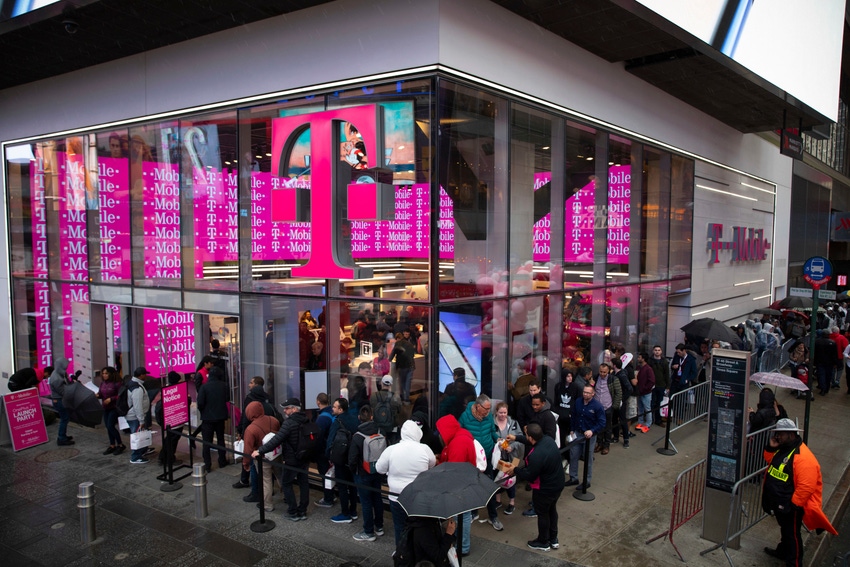T-Mobile's FWA strategy poised to get another boost
Congress recently passed the 5G Spectrum Authority Licensing Enforcement Act, which directs the FCC to issue more 2.5GHz spectrum to T-Mobile. That could add more juice to T-Mobile's FWA play.

President Biden is expected to soon sign legislation that would pave the way for T-Mobile to gain more 2.5GHz spectrum in rural areas. That could give the company the ability to improve the speed and capacity of its 5G network in rural areas – including in locations where the company is using that network for fixed wireless access (FWA) services.
That could spell trouble for the cable companies competing against FWA services from the likes of T-Mobile. For example, a new survey from the financial analysts at TD Cowen found that demand for FWA "is not running out." The survey, based on answers from 1,000 US broadband customers taken in September, showed that 48% of respondents would consider switching to FWA if it were available for a lower price and at a slower speed than their current broadband service.
Specifically, the firm said 66% of DSL customers indicated an interest in switching to FWA, while 47% of cable customers would consider a switch.
Those numbers should grab cable's attention, as the financial analysts at Evercore recently pegged FWA as one of several factors contributing to Charter's expected broadband customer losses in the fourth quarter.
Regardless of the competitive impact, T-Mobile's leadership is undoubtedly celebrating House passage of the 5G Spectrum Authority Licensing Enforcement Act. The legislation contains less than 300 words and directs the FCC to distribute spectrum licenses that were put up for auction last year.
A concerted campaign
The FCC's Auction 108 of 2.5GHz spectrum licenses ended in 2022. T-Mobile spent $304 million in the auction, winning 90% of all the licenses sold, or 7,156 of the 7,872 total licenses that received winning bids.
However, the FCC earlier this year lost its congressional auction authority to administer spectrum licenses amid a battle in Washington over the future of the 3.1GHz-3.45GHz spectrum band. As a result, FCC Chairwoman Jessica Rosenworcel argued the agency did not have the legal authority to release Auction 108 licenses to auction winners – but other members of the five-person commission disagreed.
Rosenworcel "might have hoped that taking that position might have resulted in Congress reauthorizing the FCC auction authority, instead it resulted in T-Mobile successfully convincing Congress to pass a short law requiring the FCC to grant the licenses," Blair Levin, a policy adviser to New Street Research and a former high-level FCC official, wrote in a note to investors this week.
T-Mobile's Auction 108 winnings have been stuck in limbo for months amid the political crossfire. Now the company seems poised to get those licenses.
"The granting of the licenses will have an immediate impact on T-Mobile operational performance as T-Mobile has already built out the towers and radios to utilize much of this spectrum," Levin explained. "The legislation passing is a plus for T-Mobile, a negative for AT&T and Verizon, and due to more in-home broadband opportunities, likely a negative for Charter and Comcast."
Other spectrum options
T-Mobile CEO Mike Sievert recently boasted that the operator now covers 300 million people with its 2.5GHz midband 5G network. He added that, by the end of the year, the operator would deploy roughly 200MHz worth of that 2.5GHz spectrum. Wireless network speeds and capacity are directly related to the amount of spectrum an operator can deploy.
"It's just a huge, huge advantage," Siever said at a recent investor event, according to Seeking Alpha, in discussing T-Mobile's 2.5GHz holdings. Indeed, AT&T and Verizon have been urging the FCC to limit the amount of spectrum T-Mobile can own.
However, Sievert again appeared to indicate T-Mobile's hesitancy in deploying its other midband spectrum holdings, which stretch across C-band and 3.45GHz licenses.
"We ... hold until we need it," he said last week, noting that T-Mobile's 2.5GHz licenses are "plenty for the moment."
"We'll just be really smart about how we do that and where we do that," he said when questioned about T-Mobile's plans to deploy C-band and 3.45GHz.
About the Author(s)
You May Also Like












